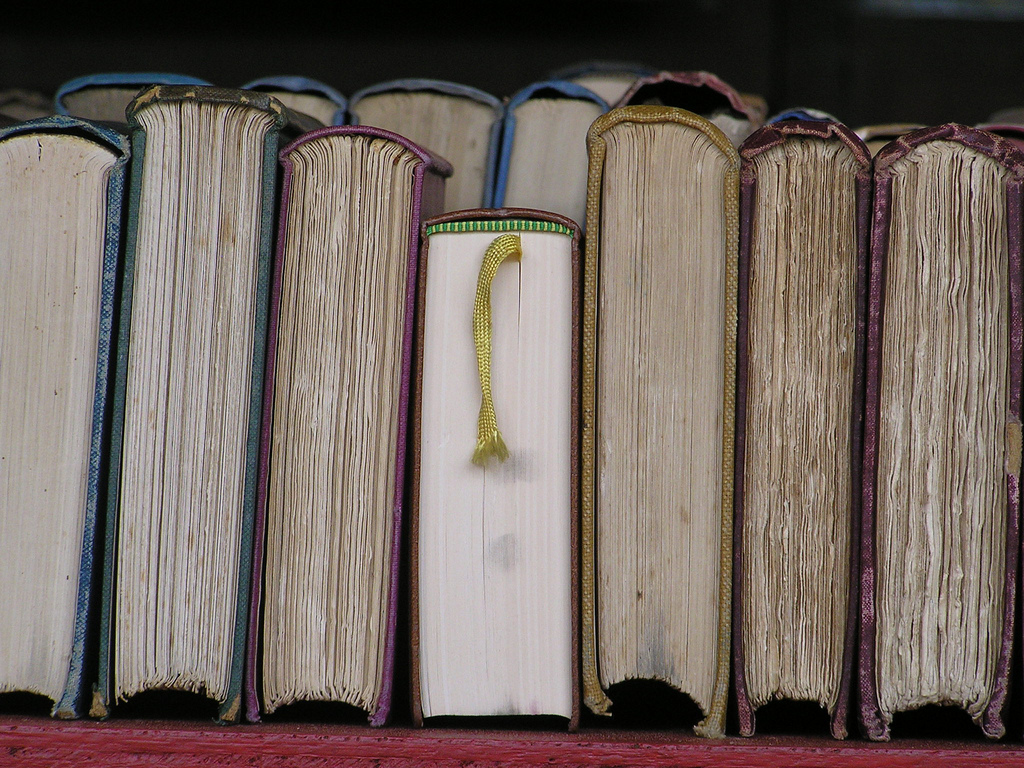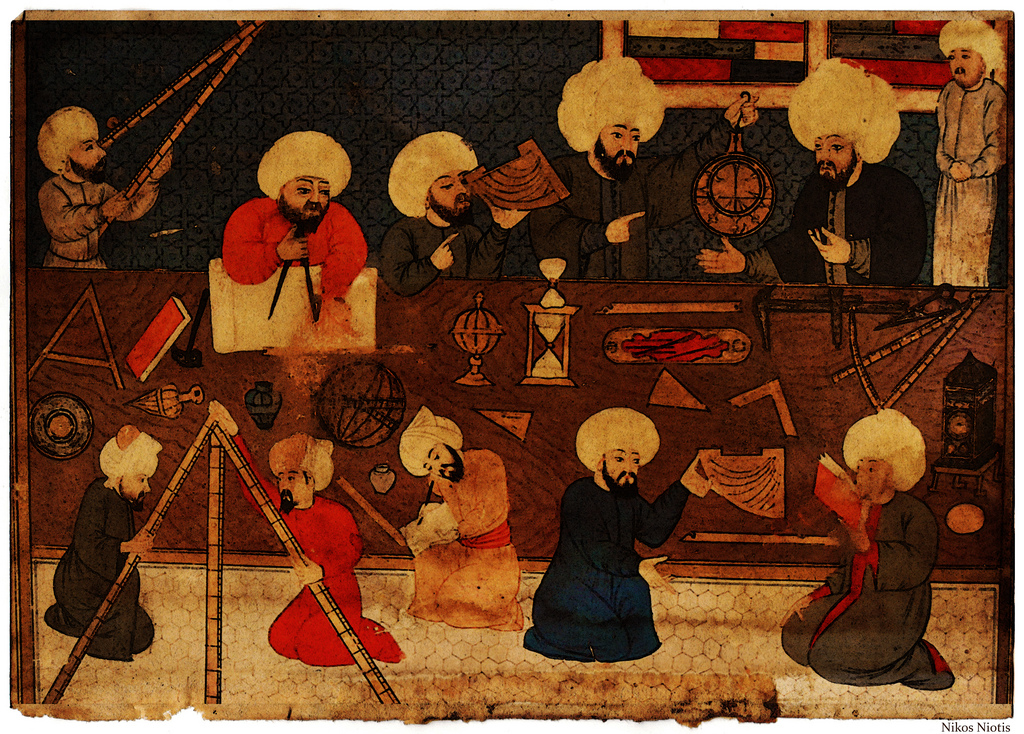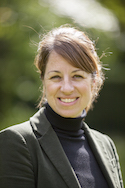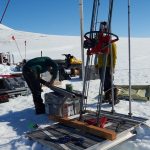
Books by Jules Hawk. Flickr. (CC BY-NC-ND 2.0)
How can we understand some of the social and cultural factors that influence our attitudes to science and religion? This is one of the questions that social anthropologist Caroline Tee is asking as she begins to study the ways in which Christian and Muslim scientists interpret their scriptures. In this month’s podcast (transcript below) Ruth Bancewicz met up with Caroline at the Faraday Institute, to catch up with the latest on her research and find out what motivates her in her research.
I’m sitting in the staff room with Caroline Tee who is a social anthropologist and post doctoral researcher here. We’re going to talk about what does social anthropology bring to the science and religion discussion and I guess, first of all, it is fairly important for us to know what social anthropology is.
Yes, well it’s a good question and it’s one that is asked relatively frequently because social anthropology is comparatively young as an academic discipline. It emerged really towards the beginning of the last century, so it is only around 100 years old. At its heart, anthropology is interested in the study of humans and human societies. So it asks questions along the lines of, how do people behave in society and why do they behave in the ways that they do? How do they construct social systems and maintain them and how do they look for and locate meaning in their lives? So those are some of the key concerns of the anthropologists and, I suppose, in tandem with that is the idea that all of our research is in some senses comparative. So we’re looking for ways in which human societies are comparable and diverse across the world.
So what is it exactly that you’re working on here?
- © Greg Balco (International Thwaites Glacier Collaboration)
- shutterstock
I’m working on a project called Science and Scripture in Christianity and Islam, and the goal of that project is to understand how professional scientists, who identify as Muslim or Christian, read their sacred texts, so read the Bible or the Quran. To that end I am doing field work with early career researchers across the UK who identify as Muslim or Christian of any flavour, any denomination, and I’m doing an online survey in the first instance and then one-to-one interviews following up in more depth, and I’m trying to understand how people who spend their working lives immersed in a scientific world view and the scientific method, engage with the notion of divine revelation through a sacred book, because the two seem to be quite strange bed fellows in some senses. So, I’m about half way through the fieldwork at the moment.
Do you have any inkling so far about how scientists might see faith or how they approach faith? Does anything strike you?
It is premature to draw any proper conclusions, but I think what strikes me immediately is that there is an enormous amount of diversity within my pool of respondents already, which in some senses I would suggest reflects the general population. So there isn’t one way or a handful of ways even, that scientists relate to faith. I think something that one interviewee said recently was quite helpful, and this was somebody who works in particle physics and their observation was that in order to make sense of faith, they employ a similar mechanism to the one that they use in their work in physics, and that is to compartmentalise the things that they don’t necessarily fully understand, and this person had an incredibly… he was quite a successful researcher but they had a very humble way of talking about their engagement with physics, and admitted there were physicists out there who were brighter than them and better than them, and whose work they didn’t really fully get, but they were willing to put those things to one side in order to get a grasp of the broader picture. And this person’s explanation was that that’s the same practice that they employ in their religious faith, they don’t understand miracles, they don’t understand the authority of scripture as the word of God, intellectually, but they’re willing to put those things to one side because the broader picture of religious faith makes sense to them.
So there’s mystery in both. Is it a mystery that’s an inquiring, “I want to unravel it”, or is it “there are things I will never understand”?
I think, presumably, in the case of the physics example there has to be an active enquiry because it’s not okay to sit on too much lack of understanding without wanting to understand it. I think in the case of faith, I mean this person had, and most of my interviewees who are full time science researchers haven’t studied theology full time, so they haven’t got the time, the space or the tools necessarily to grapple with these questions in the depth they might like to, but I think there’s an openness there, if you like, an openness to know or not to know, which is, I think, quite interesting.
It is nice to know, as usual, that the reality is a bit more nuanced than the stereotype we’re often told!
The second observation from the fieldwork so far is, I think, that the scientific community in the UK is incredibly international. So a lot of people I’m interviewing have not been born and brought up in the UK. One of the things I have observed is that it seems to be the case that the person’s cultural background or national background is more significant in influencing the way they view the relationship between science and faith than is their religious background. So I have interviewed some Muslims and some Christians from the same country outside the UK, and they had far more in common with one another than they did with co-practitioners of their respective religions. So that is an area I am looking to follow up on as well, but the idea of the trans-nationality of the scientific community and what that means for the science religion debate.
It will be really interesting to find out more results you get as time goes on! One of the things that I have heard about is that science really flourished in the Arab world hundreds of years ago, including medicine, astronomy and mathematics, and then it died out. The story I have been told is that we’re not really sure why that happened. Now, obviously, science has been happening for quite a while in the Muslim majority world, but do you have any thoughts about that?

Islamic Science and Technology. taken in the ‘Museum of The History of Science and Technology in Islam’ Istanbul, Turkey. Edited by Nikos Niotis. (CC BY-NC 2.0)
The question of the Islamic golden age is one that occupied a lot of people, quite understandably. It is broadly recognised that there was an age of great prosperity where the Muslim caliphate led the world in, not just scientific thinking, but in philosophy and the arts and so on, and that came to a relatively sudden end around the 12th or 13th centuries. One reason for that is an enormous socio-political shift which was the arrival of the Mongol invasion from central Asia, which meant that institutionally the places that had been focussing on science were dismantled, so there was nowhere to practice. [R: Yes, being invaded is generally not a good thing!] It’s not a good thing on the whole. And the second factor that is always appealed to is the rise, the emergence and the impact of a figure called Al-Ghazali, who wrote a treatise called The Incoherence of the Philosophers. That work is one of the most influential in the history of Islamic theology and really defended theology over philosophy, which is, seen by some people, as being the reason why free scientific enquiry diminished after that time. But it is I think also important to say that this, the narrative of a sudden end to the golden age is challenged in quite a lot of quarters. So there is evidence that scientific work carried on in Muslim societies after the 12th century and up until the present day and it doesn’t really fit quite as neatly as one might think into this historical framework of a sudden end and then the takeover by the West, if you like.
A bit like the narrative of the dark ages in Europe?
Yes, that they might not be quite as dark as people said.
Can I finish with a big question about what you hope social anthropology will bring to the field of science and religion – not just understanding Islam and science, but as a whole?
I think there are two things that social anthropology can offer to this field and the one of them relates to the internal dynamics of the field, so the way that scientists and theologians talk to one another within the field of science and religion. There are certain examples I think of good ethnographic work which help non-scientists to understand how scientists operate. There’s a really good piece by an anthropologist called Sharon Traweek which is called ‘Beamtimes and Lifetimes: The World of High Energy Physicists’ and what she does, she provides an ethnography of how physicists in the United States operate within their lab. [R: an ethnography is…?] An ethnography is a detailed micro-study over a long period of time of a small group of people. But I think this piece is a really helpful piece perhaps for theologians to read to understand the processes and the structures within which physicists and their co-scientists, their fellow scientists, operate, and how they construct knowledge and how they identify truth, if you like, and what are the ways in which those, their scientific conclusions are arrived at. So I think that’s one way that anthropology can help the debate, it can perhaps lessen the divide between theology and lab-based science.
I think the other way is that it can add some shading to the conversation. And by that I mean, it can open up the debate beyond intellectual argument and it can shed light onto the ways in which people receive information about the scientific world in light of their religious beliefs or lack of religious beliefs, so there are all kinds of influencing factors there that I’m thinking of which don’t generally get talked about in books that are reconciling Christian theology with scientific discovery and that is really the stuff that dictates or that drives the work going on at the moment in the Muslim/Muslim-majority world, is how does the fact that modern science came in as a Western import during the colonial age affect the way that local populations interpret it and relate to it. That is an incredibly politicised question and it’s an important one. People in the UK are similarly influenced by politics and history in the way that they negotiate the science religion question.
Certainly the more I’m involved in science and religion, the more I realise that every question is much more complex than you really think. For example the rise of Young Earth Creationism or attitudes to new technologies are affected by so many social and cultural and political factors, that I’m very glad there are people like you unravelling them and trying to understand them. So thank you for talking to us today Caroline and we’ll put some of the links to some of the things you were talking about up on the science and belief webpage.
Great, thanks a lot Ruth.
 Caroline Tee is a social anthropologist of Islam, and currently a Research Associate at the Faraday Institute for Science and Religion. She is working alongside Dr Hilary Marlow on the project Science and Scripture in Christianity and Islam, exploring the ways in which Muslim and Christian scientists from different contexts relate their scriptures and traditions to the scientific worlds in which they operate. Caroline originally studied English Literature at Durham University, before living and working in Turkey for five years. She subsequently gained a Masters degree in Islamic Studies at Exeter, and a PhD in Social Anthropology and Religious Studies from Bristol, focusing on the Alevi community in Turkey. This was followed by postdoctoral research in the Department of Archaeology and Anthropology at Bristol University, on a major Turkish religious organisation, the Gülen Movement, exploring its engagement as a pious religious group with modern science and science education. Her book The Gülen Movement in Turkey: The Politics of Islam and Modernity, was published in August 2016.
Caroline Tee is a social anthropologist of Islam, and currently a Research Associate at the Faraday Institute for Science and Religion. She is working alongside Dr Hilary Marlow on the project Science and Scripture in Christianity and Islam, exploring the ways in which Muslim and Christian scientists from different contexts relate their scriptures and traditions to the scientific worlds in which they operate. Caroline originally studied English Literature at Durham University, before living and working in Turkey for five years. She subsequently gained a Masters degree in Islamic Studies at Exeter, and a PhD in Social Anthropology and Religious Studies from Bristol, focusing on the Alevi community in Turkey. This was followed by postdoctoral research in the Department of Archaeology and Anthropology at Bristol University, on a major Turkish religious organisation, the Gülen Movement, exploring its engagement as a pious religious group with modern science and science education. Her book The Gülen Movement in Turkey: The Politics of Islam and Modernity, was published in August 2016.





